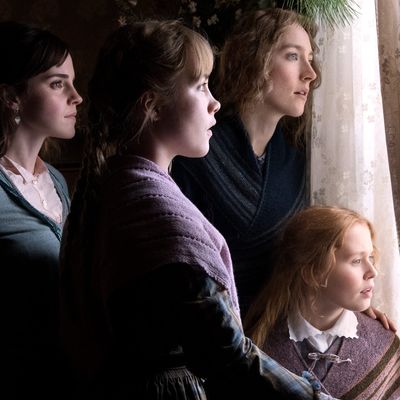
I’ve loved Little Women for as long as I can remember, and it wasn’t until recently that I thought much about why. Certainly, there’s an element of recognizing myself in Jo, the tomboyish (read: gay) wannabe writer who leaves her hometown for the literary world of New York City. The book, unlike most of the movie adaptations, has a deliciously misandrist, boy-hating element, and is genuinely funny. And because the plot is so familiar to me, it’s fun to see how (or if) each new iteration, like Gerwig’s 2019 movie, works to distinguish itself from the rest. The story is a relatively blank canvas on which to project one’s values, desires, and tastes. I didn’t think my interest was much deeper than that.
Then, the other night, the writer (and Cut contributor!) Meaghan O’Connell posted a scintillating theory: Little Women, she tweeted, is a book for only children. Whoa.
A friend of mine posted the tweet in our dedicated Little Women group text, which is actually a lot more active than you might think, even before the 2019 movie was announced. (We also sometimes talk about Austen adaptations, for instance.) “Thoughts???” my friend texted. “Do people with sisters like Little Women????”
Our foursome, we soon discovered, was entirely sisterless: Three of us have brothers, and one is an only child. Sure, four is a small sample size, but consider, also, that this is a group of Little Women fans so dedicated we made a group text to talk about it. This is the group who, in 2015, took a road-trip-slash-pilgrimage to the Orchard House, Louisa May Alcott’s residence, in Concord, Massachusetts. (The new movie used a replica set nearby.) There is perhaps no other foursome that better represents Little Women fandom, and yet — none of us even have sisters.
I asked the rest of the internet if O’Connell’s theory held true for them.
“I’m an only child who would definitely define myself as a Little Women super fan,” says Andrea. “I bought a used VHS tape from Blockbuster of the 1994 version, and probably watched it 200 times over the summer of 1995.” Jennifer, another only child, was similarly fervent as a kid. “I own multiple copies of the book. I’ve seen all the movies,” she says. “Reading about the March sisters was like watching what it must be like to have a big family.”
It’s not just the sisters that sisterless readers found appealing, either. “Imagine a world in which I had not just one sister, but three!” says Gayatri. “And an attic, no less!”
Still, for some people without sisters, the book was nice and all, but not exactly enviable.
“To be honest, the book and movie only reinforced my appreciation for having brothers and did not make me wish to have sisters,” says Alexi. “Perhaps unsurprisingly, I relate to Jo most.”
Some people who do have sisters told me they appreciated Little Women for its idyllic view of sisterhood. “I’m a huge fan of Little Women, and I have 4 sisters,” says Caitlyn. “I actually found the books more aspirational than relatable. Like, damn, I wish our relationships were this solid or interesting.”
O’Connell’s theory — like so many thought-provoking Twitter theories — is resonant, if not bulletproof. The responses I got were pretty mixed: Some people like Little Women and some people, somehow, don’t. Some of those people have sisters, and some don’t. Personally, I’m not sure I buy that my fondness for the franchise is possible because I don’t have a sister, but there’s no way for me to prove that. I didn’t want a sister growing up (too competitive), but as an adult, it sounds nice, and maybe that’s why my bottomless appetite for Little Women content sustains. It’s easy to idealize what we don’t have.
Says O’Connell, “I have a sister, and let’s just say we did not put on plays together.” But, she added, maybe she just feels this way because she’s a Meg.


